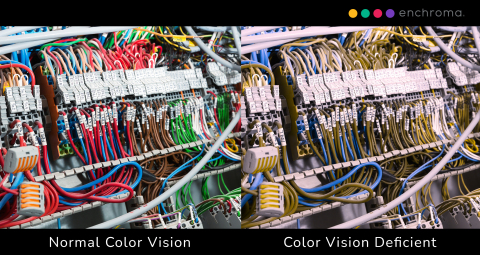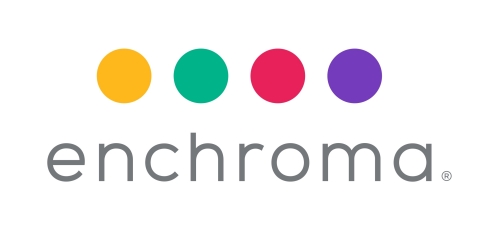Seventy-Five Percent of Color Blind People Experience Challenges at Work, EnChroma Study Finds
Seventy-Five Percent of Color Blind People Experience Challenges at Work, EnChroma Study Finds
– Survey Illustrates Workplace Frustrations of Color Vision Deficiency on the Job; EnChroma Outlines Accommodation Steps for Employers –
BERKELEY, Calif.--(BUSINESS WIRE)--In the largest known study of its kind, EnChroma – creators of glasses for color blindness – today announced the results of a workforce survey spotlighting the frustration and obstacles that tens of millions of workers with color blindness face every day at work. Key findings include that nine of 10 people with color vision deficiency (CVD) stated that identifying colors correctly plays a role in their job; 75% report that being color blind slows them down at work; 65% have trouble interpreting color-coded materials; and over 20% can’t perform certain work that requires accurate color-identification.
“I work in the nuclear power industry where color has many important roles, from safety signage and red/green indicator lights to being able to differentiate between colored wires, and I've always had to have someone check my work,” said Zachary Rowland, a color blind maintenance supervisor for a nuclear power plant and National Guardsman.
For the one in 12 men (8%) and one in 200 women (.5%) who are color blind – 350 million worldwide – comprehending colorful information at work can cause frustration, impede productivity and create potential safety issues. From April to May 2021, 810 color blind people responded to an EnChroma survey measuring the effect of their condition on the job, with 688 relaying anecdotes from their work experiences.
“This study is critical for educating HR, safety and accessibility managers about color blindness and how, by implementing some simple guidelines, they can make the workplace more accessible for all employees,” said Erik Ritchie, CEO of EnChroma. “Color blind people are just as successful and productive as any employee, but they can use a hand to reduce the everyday nuisances and obstacles they experience related to color in the workplace.” Click here to read workplace experiences shared by color blind survey respondents.
Highlights from the EnChroma survey include:
- 75% of color blind people ask coworkers to verify colors on a weekly or daily basis (e.g., wires, medicine labels, chemicals, graphs, drawings or other items) with 31.28% replying ‘Almost Daily’ and 43.47% ‘A Few Times a Week.’
- More than three out of four color blind workers report frustration or delays on the job due to color blindness, with 35.59% replying ‘Almost Every Day,’ and 41.85% ‘Occasionally’ (about 1x per week).
- More than half worry color blindness could cause them to make mistakes (51.51%) at work.
- 80% believe EnChroma glasses for color blindness could help them do their jobs better (80.18%), while 63% say the glasses might save them time, improve productivity and make them feel more confident.
Recommended Steps for Employers:
EnChroma’s Color Accessibility Program encourages employers to implement simple guidelines to adapt work materials and workplace environments to accommodate red-green color vision deficient staff, such as:
- Avoid using colors containing red or green in presentations, spreadsheets, graphs, safety signage, operational controls, instructional and other materials.
- Educate managers, creative teams and staff about the prevalence of color blindness and its effects. Avoid using problematic colors like red and green.
- Label colors in workplace materials to facilitate correct color-identification for color blind staff.
- Consider making reasonable workplace accommodation assistive tools available to color blind employees, like EnChroma glasses for color blindness.
The 810 survey respondents are color blind people who work in fields in which they occasionally or routinely wear safety glasses, such as chemists, military medics, electricians, utility workers, law enforcement officers, warehouse pickers and others.
EnChroma recently launched the world’s first line of EnChroma Safety Glasses to help people with red-green color blindness overcome daily frustrations and obstacles at work related to correctly identifying and interpreting colors. EnChroma safety, and regular, glasses for indoor and outdoor use enable the color blind to better see colored information as well as bright warning signs and labels, while reducing everyday challenges. “I have worn regular EnChroma glasses for six years and they have been life-changing,” continued Rowland. “In my job in the power industry the ability to now wear safety glasses that allow me to see color is an absolute game-changer.”
EnChroma’s patented lens technology is engineered with special optical filters that help the color blind see an expanded range of colors more vibrantly, clearly and distinctly. A recent study by the University of California, Davis, and France’s INSERM Stem Cell and Brain Research Institute, demonstrated the effectiveness of EnChroma glasses.
Product shots, still images and interactive GIFs illustrating the challenges on the job for those with color vision deficiencies can be downloaded by clicking here.
About EnChroma
Based in Berkeley, Calif., EnChroma produces leading-edge eyewear for color blindness and low vision, and other solutions for color vision, sold online and through Authorized Retailers worldwide. Invented in 2010, EnChroma’s patented eyewear for color blindness combines the latest in color perception, neuroscience and lens innovation to improve the lives of people with color vision deficiency around the world. EnChroma received an SBIR grant from the National Institutes of Health (NIH). It earned the 2016 Tibbetts Award from the U.S. Small Business Administration in recognition of the firm’s innovative impact on the human experience through technology, and the 2020 Innovation Award in Life Sciences from the Bay Area’s East Bay Economic Development Alliance. For more information call 510-497-0048 or visit enchroma.com.
Contacts
Media Contact:
Kent Streeb
Director of Public Relations and Partnerships
P: 530.908.9225
kent@enchroma.com

